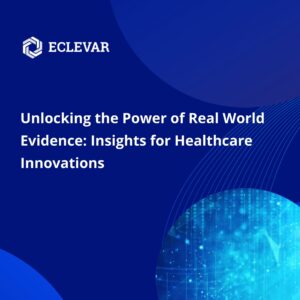How Can Real-World Evidence Unlock the Power of Healthcare Innovations?
Regulatory bodies such as the U.S. Food and Drug Administration (FDA) have acknowledged the significance of Real World Evidence (RWE) for evaluating medical products. While Randomized Clinical Trials (RCTs) remain the preferred method for reviewing drug and device applications, Real World Data (RWD) that are appropriate for the intended purpose are also being considered to potentially complement certain submissions.
The advantage of RWE lies in its ability to offer insights into the real-world use and outcomes of treatments in everyday clinical practice, as opposed to a controlled trial environment. With the availability of robust and reliable data, there are now analytic techniques that can be applied to RWD for predictive purposes, further enhancing its potential applications in regulatory decision-making.
Discover the transformative potential of Real World Evidence in healthcare research and innovation. Gain valuable insights from our expert CRO team, leveraging real-world data to drive evidence-based decision making and improve patient outcomes.
What is Real World Evidence?
Real World Data (RWD) refers to data collected from various sources that are related to patient health status and the delivery of healthcare. These sources include:
- Electronic health records (EHRs)
- Medical claims and billing data
- Insurance data
- Product and disease registries
- Patient-generated data from in-home-use settings
- Data from mobile devices that provide insights into health status.
Real World Evidence (RWE), on the other hand, is the clinical evidence gathered from the analysis of RWD, which leads to insights on the usage, potential benefits, and risks associated with a medical product.
RWE studies complement clinical trials by providing a broader perspective and generalizing the findings from trials to the wider population. They also offer valuable information on many aspects such as the natural history and course of diseases, effectiveness studies, outcome studies, and safety surveillance, which may not be captured in the controlled environment of clinical trials.
The difference between Real World Evidence and Randomized Clinical Trial
RCTs serve as crucial initial studies to determine the safety and efficacy of investigational products. However, the trial primarily focusses on internal validity, which may limit their generalizability to the broader population.
The selective nature of RCTs often leads to the exclusion of patients with comorbidities, and these trials are typically conducted in highly controlled settings. Although clinical treatment guidelines heavily rely on RCTs results, it is important to supplement them with evidence from diverse real-world clinical scenarios to ensure broader applicability and relevance.
In contrast to RCTs, Real World Evidence studies offer several advantages, such as reduced time, resource, and cost requirements, as well as fast access to data and easy retrieval, facilitating efficient research.
While Randomized Clinical trials are considered the gold standard, RWD and RWE can be used to supplement and enhance their findings, facilitating a more comprehensive evaluation of the safety, effectiveness, and real-world impact of medical interventions.
Assessing Real Word Evidence Data
The digitalization of health records has seen substantial advancements over the past two decades. Electronic health-care records (EHRs) have emerged as organized repositories of health-care data that can be accessed electronically.
These records gather a wide range of information, including medical records from different healthcare providers such as general practitioners, specialists, and hospitals, as well as data from pharmacies, prescription records, and occasionally lifestyle-related details. The digital nature of EHRs allows for easier aggregation and analysis of RWD, making it a valuable resource for research purposes.
RWD can be accessed from different sources, such as:
- Medical Device claims
- State Medicaid
- Insurance companies.
- Clinical trial data such as pragmatic study
- Product registry
- Disease registry.
- EHR from clinicians/hospitals
- Laboratory test
- Billing data.
- Patient social media
- Patient advocacy groups/patient communities.
Tools for evaluating whether RWE can appropriately support decision making
When assessing RWE studies, clinicians must carefully evaluate aspects of the RWE, such as:
- Data quality: Is the quality of the data source used appropriate?
- Transparency of analytical research approach: Was the research design and process clearly communicated?
- Statistical Methods: Were appropriate statistical methods applied?
- Reproducibility: Is the study replicable?
Documentation required for Real World Evidence study under MDR
RWE generation systems, as part of the Post-Market Clinical Follow-up (PMCF) process, must comply with the documentation requirements specified in the Medical Device Regulation (MDR).
According to Annex II and III of the MDR, several documents need to be produced to support each medical device, including a PMCF Plan, PMCF Report, and Clinical Evaluation Report (CER). These documents serve to outline the strategy for gathering real-world data, report the findings of the study, and evaluate the clinical performance of the device.
MDR Annex XV also lists a range of requirements that must be followed to for every form of clinical study, including those intended to generate RWE. These requirements include the production of:
- Clinical investigation plan
- Information letter to patients
- Case report form
- Statistical plan.
Transparency and validity of studies may increase with the publication of statistical analysis plans (SAPs) before data have been accessed to discern data-driven analyses from pre-planned analyses.
Eclevar – Reliable and Meaningful Real-World Evidence for Clinical Trials
Data quality is a critical aspect of any research study, including Real World Evidence studies. It encompasses the completeness, consistency, and accuracy of data across all investigational centres involved in the study.
ECLEVAR MEDTECH recognizes the significance of data quality and conducts feasibility studies before engaging in clinical studies. By demonstrating the adequacy of the data source for the intended use, we ensure that reliable and meaningful RWE can be generated.
We can see your challenges from different angles for better understanding. From clinical reports to Real World Evidence data collection, you can count on us to support your study.

